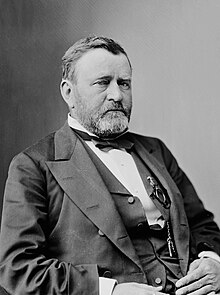President Ulysses S. Grant
| Ulysses S. Grant | |
|---|---|

President Grant
|
|
| 18th President of the United States | |
|
In office March 4, 1869 – March 4, 1877 |
|
| Vice President |
|
| Preceded by | Andrew Johnson |
| Succeeded by | Rutherford B. Hayes |
| 6th Commanding General of the United States Army | |
|
In office March 9, 1864 – March 4, 1869 |
|
| President |
Abraham Lincoln Andrew Johnson |
| Preceded by | Henry W. Halleck |
| Succeeded by | William Tecumseh Sherman |
| United States Secretary of War Ad interim | |
|
In office August 12, 1867 – January 14, 1868 |
|
| Personal details | |
| Born |
Hiram Ulysses Grant April 27, 1822 Point Pleasant, Ohio, U.S. |
| Died | July 23, 1885 (aged 63) Wilton, New York, U.S. |
| Resting place |
General Grant National Memorial Manhattan, New York |
| Political party | Republican |
| Spouse(s) | Julia Grant (m. 1848) |
| Children | Frederick, Ulysses Jr., Nellie, and Jesse |
| Parents |
Jesse Root Grant Hannah Simpson |
| Alma mater | United States Military Academy |
| Occupation | Soldier, politician |
| Signature | |
| Military service | |
| Allegiance |
|
| Service/branch | |
| Years of service | 1839–1854 1861–1869 |
| Rank |
|
| Commands |
|
| Battles/wars |
|
| The Grant Cabinet | ||
|---|---|---|
| Office | Name | Term |
| President | Ulysses S. Grant | 1869–1877 |
| Vice President | Schuyler Colfax | 1869–1873 |
| Henry Wilson | 1873–1875 | |
| None | 1875–1877 | |
| Secretary of State | Elihu B. Washburne | 1869 |
| Hamilton Fish | 1869–1877 | |
| Secretary of Treasury | George S. Boutwell | 1869–1873 |
| William A. Richardson | 1873–1874 | |
| Benjamin H. Bristow | 1874–1876 | |
| Lot M. Morrill | 1876–1877 | |
| Secretary of War | John M. Schofield | 1869 |
| John A. Rawlins | 1869 | |
| William W. Belknap | 1869–1876 | |
| Alphonso Taft | 1876 | |
| J. Donald Cameron | 1876–1877 | |
| Attorney General | Ebenezer R. Hoar | 1869–1870 |
| Amos T. Akerman | 1870–1871 | |
| George H. Williams | 1871–1875 | |
| Edwards Pierrepont | 1875–1876 | |
| Alphonso Taft | 1876–1877 | |
| Postmaster General | John A. J. Creswell | 1869–1874 |
| James W. Marshall | 1874 | |
| Marshall Jewell | 1874–1876 | |
| James N. Tyner | 1876–1877 | |
| Secretary of the Navy | Adolph E. Borie | 1869 |
| George M. Robeson | 1869–1877 | |
| Secretary of the Interior | Jacob D. Cox | 1869–1870 |
| Columbus Delano | 1870–1875 | |
| Zachariah Chandler | 1875–1877 | |
Ulysses S. Grant (born Hiram Ulysses Grant; April 27, 1822 – July 23, 1885) was a prominent United States Army general during the American Civil War and Commanding General at the conclusion of that war. He was elected as the 18th President of the United States in 1868, serving from 1869 to 1877. As Commanding General, Grant worked closely with President Abraham Lincoln to lead the Union Army to victory over the Confederacy. After Lincoln's assassination, Grant's assignment in implementing Reconstruction often put him at odds with President Andrew Johnson, Lincoln's successor. Twice elected president, Grant led the Republicans in their effort to remove the vestiges of Confederate nationalism and slavery, protect African-American citizenship and civil rights, implement reconstruction and support economic prosperity. Grant's presidency has often been criticized for its scandals and for his failure to alleviate the economic depression following the Panic of 1873, but modern scholarship regards him as a president who performed a difficult job during the early post Civil War era.
Grant graduated in 1843 from the United States Military Academy at West Point and served in the Mexican–American War. After the war, he married Julia Dent in 1848, and together they had four children. Grant retired from the Army in 1854 and struggled financially in civilian life. When the Civil War began in 1861, he rejoined the U.S. Army and quickly rose through the ranks. As a general, Grant took control of Kentucky, most of Tennessee, and won major battles at Battle of Shiloh and seized Vicksburg, gaining control of the Mississippi River and dividing the Confederacy. After Grant's victories in the Chattanooga Campaign, earning a reputation as an aggressive commander, Lincoln promoted him to lieutenant general and Commanding General of the Army in March 1864. Grant confronted Robert E. Lee in a series of bloody battles, trapping Lee's army in their defense of Richmond. Grant coordinated a series of devastating campaigns in other theaters, as well. In April 1865, Lee surrendered to Grant at Appomattox, effectively ending the war. Historians have hailed Grant's military genius, and his strategies are featured in military history textbooks, but a minority contend that he won by brute force rather than superior strategy.
...
Wikipedia
